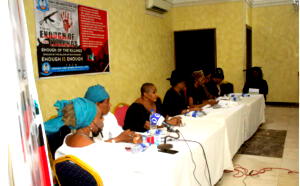By Ebele Orakpo The state of the black continent usually associated with abject poverty, diseases, hunger, strife etc, has been blamed on ...

By Ebele Orakpo
The state of the black continent usually associated with abject poverty, diseases, hunger, strife etc, has been blamed on so many things, especially slavery and colonialism.
Recently, a video in which a Zambian man attributed Africa’s poor state to the curriculum bequeathed to her by the colonialists went viral.
“They realised that if they take away Africans from practice and move them to theory, they will be creating a labour force for themselves so they brought a school system which did not promote thinking but promoted remembering for the sake of creating good employees who don’t think but can remember.
“You memorise everything! At the end of the day, they produced someone who was a container of useless knowledge.
“When this mission succeeded, they came to set up industries and who was the labourer? The graduates from the school of remembering!
“They rewarded you with a bribe called salary and we became comfortable. This is what made Africa poor,” he had said.
In this report, Vanguard Learning sought the views of stakeholders on this assertion. Below are their responses:
TWO sets of curricula
Responding, the Director, Academic Planning/Head, Materials Science and Engineering Dept, Africa University of Science and Technology, Abuja, Prof. Peter Onwualu, agreed with the assertion to some extent.
“At inception, we inherited two sets of curricula. The Grammar school type which encouraged theory and remembering. The idea was to produce students with broad knowledge at the secondary school level who then move on to the university to acquire degrees.
“Such students were to look for white-collar jobs where they would be retrained on the job to become administrators and managers.
“The second curriculum emphasized project-based learning with hands-on skills. This gave rise to the comprehensive, vocational, commercial and technical schools. These students ended up in polytechnics, colleges of education and agriculture.
“The curriculum produced people with vocational skills who could make and fix things.
READ ALSO: Stop claiming Buhari’s initiatives as your constituency projects, FCC tells NASS
“Unfortunately, people looked down on this class of graduates (OND, HND, NCE) and everybody wanted their children to be university graduates.
“That made the polytechnics to begin to change their curriculum towards the direction of universities. This has contributed more than anything else, to the challenge we have today. The curriculum has also not kept pace with global changes.”
Static Curriculum
“The curriculum has not changed much over the years because of bureaucracy and rigidity of the regulatory agencies. Regulation is by government agencies and professional bodies who are supposed to continuously assess the economy and dynamically change the curriculum to adapt to global changes.
“They have tried over the years to introduce soft skills, entrepreneurship, vocational, project-based learning, critical thinking and ICT skills for all courses, but implementation has not been very effective as many of the higher institutions are slow in implementation.
“These have been worsened by lack of resources including personnel, laboratories, industrial training and poor linkages with industry,” said Onwualu.
Bastardised systems
Prof. Bashir Raji, immediate past Vice-Chancellor, Fountain University, Osogbo, said the problem is not just the curriculum. “Most of our curricula are patterned after renowned universities.
“The problem is that our systems have been bastardised because of lack of funding and over-crowding, stretching our facilities beyond functional ability.
“The whole of the budget to federal universities in Nigeria is less than the budget of Harvard University! We have a situation where the necessary equipment to impart skills are unavailable or the number of students is more than what the available facilities can cater for.
“What do you expect a lecturer to do when the needed facilities are not provided? For example you teach a class where students are expected to master the use of GPS but the class of 900 students has access to only one GPS!
ALSO READ: Transportation University will boost technology transfer ― Amaechi
“How on earth can the needed skills be imparted! A situation where the teacher to student ratio is above 40 for most courses compared to a ratio of 1:6 in Harvard University!
“It is not just the curriculum but the facilities, student populations to available lecturers, library and internet accessibility etc.
“The problems are just legion and only a state of emergency on education can assist to mitigate slightly the problem.”
Sweeping statements
Prof. Bayo Lawal of the Faculty of Education, University of Ilorin noted that the Zambian’s submission contains sweeping statements and assumptions.
“What level of education is he talking about? What is his conception of ‘curriculum’? Is it the formal written curriculum, or the interpreted or executed versions, among other possibilities?
“Curriculum is as complex and elastic as the whole concept of education itself. In any case, he has used ‘theory’ to talk about ‘theory-based curriculum’ as his submission is not based on evidence from at least one subject from one curriculum at one level in the educational system of one African country.
“Yet, he has over-generalised. He needs to prove his point with hard data and concrete evidence.”
Failed curriculum
In his contribution, Prof. Macdonald Idu, professor of Phytomedicine of the Dept of Plant Biology, University of Benin said the current Nigerian curriculum has failed.
“If you look at it properly, it has no in-depth practical content and because it is based on memorisation, students just memorise whatever they want to memorise to pass exam.
“There is no application so we need to sit down and look at it critically. Why is it that we can’t invent anything and the industrial sector cannot benefit from the kind of curriculum we operate?
“As a nation, we never sat down to think or reason it out. Africa does not understand the kind of educational system it is running.
We never sat down to evaluate the 6-3-3-4 educational system we are running, whether it has led to national growth, helped our industries or been able to affect us as a nation positively.
“Till date, we are importing everything including toothpick. We don’t have the technology to do anything apart from the very few that go outside the country to learn what I will call the ‘backyard’ of real education because the white people will never teach you the real thing, they will always give you just the side of it and take the money; that’s the truth.”
The post Africa’s underdevelopment result of poor curriculum? appeared first on Vanguard News.

No comments